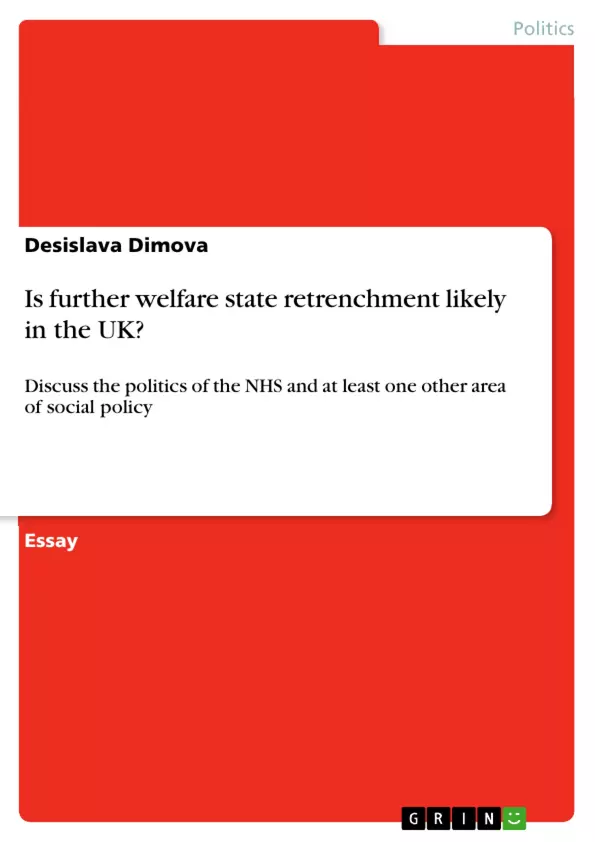The welfare state is an important part of the British state politics since its establishment and development. It is becoming increasingly difficult to ignore the modern society processes like aging of population, rise of unemployment, declining financial resources and their pressure over the welfare system structure. The rapid economic and demographic changes after the Second World War are having a serious effect on the social policy system of Britain. In recent years there has been an increasing interest among social scientists in the examining and restructuring the welfare state system, particularly after the conservative welfare state reforms of the 80’s. The issue of welfare retrenchment has been a controversial and much disputed subject within the field of social policy. This paper will focus on the question if further welfare state retrenchment is likely in the UK, critically examining the politics of the National Health Service and the Politics concerning Disabled People.
The first section of this paper will concentrate on the status of the welfare system in the state and the main sources of influence for successful retrenchment policies. It will than go on to the particular policy field of the Health services in the UK and outline its specific position in the British welfare system. Finally, the essay will describe the special features in the Disabled Politics in Britain and discuss if further welfare retrenchment in this area is expectable.
Inhaltsverzeichnis (Table of Contents)
- Welfare State Retrenchment in the UK
- Welfare System in the State and Sources of Influence for Retrenchment
- Health Services in the UK
- Disabled Politics in Britain
Zielsetzung und Themenschwerpunkte (Objectives and Key Themes)
This essay examines the likelihood of further welfare state retrenchment in the UK, focusing on the politics of the National Health Service (NHS) and the politics concerning disabled people. The essay critically analyzes the influence of various factors on retrenchment, including the structure of the state, party politics, and the role of public support.- The political and economic factors influencing welfare state retrenchment
- The role of the NHS as a universal social program and its resistance to retrenchment
- The impact of party competition and electoral strategies on welfare state policies
- The effectiveness of retrenchment attempts by Conservative and Labour governments
- The role of public support and the influence of external factors, such as an aging population, on the NHS
Zusammenfassung der Kapitel (Chapter Summaries)
The first section analyzes the general state of the UK welfare system and identifies key factors that contribute to successful retrenchment policies. It explores the contrasting ideologies of the left and right regarding the welfare state and discusses the categorization of welfare systems into “Liberal,” “Conservative,” “Corporatist,” and “Social-democratic” types.
The second section focuses on the NHS in the UK, highlighting its unique position as a universal social program with wide public support. It analyzes the structural elements of the state, including the party system and government tactics, and explores how they influence the success of retrenchment policies.
The third section delves into the politics concerning disabled people in Britain. It discusses the special features of this policy area and examines the likelihood of further welfare state retrenchment in this domain.
Schlüsselwörter (Keywords)
The key terms and concepts explored in this essay include welfare state retrenchment, the National Health Service (NHS), disabled politics, party politics, public support, structural factors, programmatic strategies, and the role of the state in social policy. The essay analyzes the interplay of these elements in determining the future direction of welfare state policies in the UK.Frequently Asked Questions
What is welfare state retrenchment?
Welfare state retrenchment refers to the process of cutting back social welfare programs, benefits, or services, often driven by economic pressures or political shifts.
Why is the NHS in the UK resistant to retrenchment?
The National Health Service (NHS) is a universal program with broad public support. Cutting its services is politically risky for any government, making it more resilient than means-tested programs.
What factors influence the likelihood of welfare cuts in the UK?
Key factors include demographic changes (like an aging population), unemployment rates, declining financial resources, and the ideological stance of the ruling political party.
How does the UK's welfare system compare to other types?
The UK is often categorized as a "Liberal" welfare state, which emphasizes market-based solutions and means-testing, though the NHS represents a significant "Social-democratic" universal element.
Is further retrenchment expected for disabled politics in Britain?
The essay discusses the specific features of disabled politics and evaluates whether this area is more vulnerable to retrenchment compared to universal services like the NHS.
- Arbeit zitieren
- MA Desislava Dimova (Autor:in), 2007, Is further welfare state retrenchment likely in the UK?, München, GRIN Verlag, https://www.grin.com/document/116757



